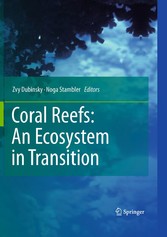Suchen und Finden

Coral Reefs: An Ecosystem in Transition
This book covers in one volume materials scattered in hundreds of research articles, in most cases focusing on specialized aspects of coral biology. In addition to the latest developments in coral evolution and physiology, it presents chapters devoted to novel frontiers in coral reef research. These include the molecular biology of corals and their symbiotic algae, remote sensing of reef systems, ecology of coral disease spread, effects of various scenarios of global climate change, ocean acidification effects of increasing CO2 levels on coral calcification, and damaged coral reef remediation. Beyond extensive coverage of the above aspects, key issues regarding the coral organism and the reef ecosystem such as calcification, reproduction, modeling, algae, reef invertebrates, competition and fish are re-evaluated in the light of new research and emerging insights. In all chapters novel theories as well as challenges to established paradigms are introduced, evaluated and discussed. This volume is indispensible for all those involved in coral reef management and conservation.
Alle Preise verstehen sich inklusive der gesetzlichen MwSt.




















